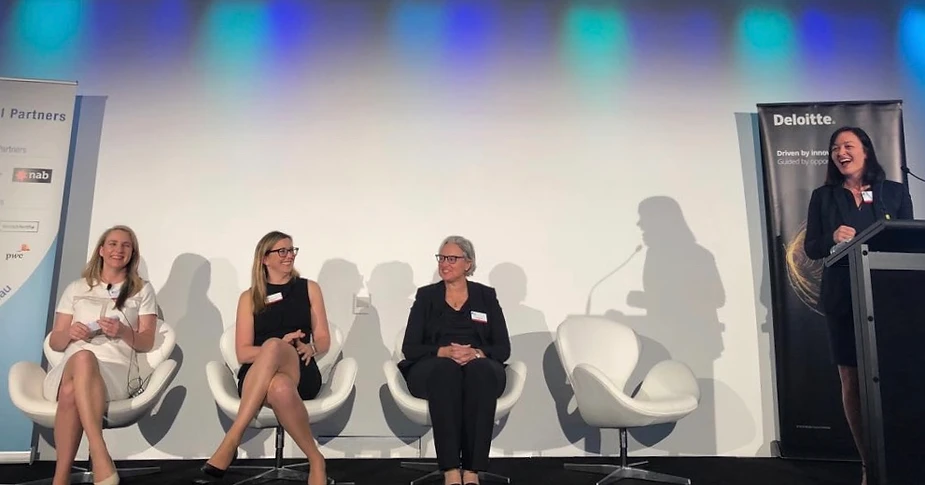By Cristin McCoy
Robotics, AI, the gig economy and new talent models were topics of discussion at The Future of Work: Disruption, Uncertainty, Opportunity session which ran on 12 September 2018 as part of the TMA Australia Conference held in Sydney.

The session was moderated by Zina Edwards, Partner, Hamilton Locke, with contributors Associate Professor Rebecca Cassells, Curtin University, Carolyn Colley, COO and Founder Faethm and Claire Forbes, Partner, Deloitte Consulting.
The panel unpacked the key trends in employment, workforce and organisational design and commented on how changes in technology and structure will impact on how the human capital elements of turnaround and organisational restructures are approached.
While robotics and automation will continue to have an impact on the working world, one strong theme which emerged from the discussion was that inter-personal and communication skills are still key attributes that managers and leaders need to have in every business.
Opening up the session, Claire Forbes provided an overview of the future of work, including the impact on:
- Work: What are the opportunities for robotics, automation and AI, what work can be automated
- Workforce: Impact on outsourcing and types of leaders required
- Workplace: Changing structures and behaviours and talents
An interesting graphic presented indicated that the rates of change differ, with technology leading the charge, and notably public policy being slowest to change and taking longer to catch up with changes in technology.
Key topics for discussion included:
How rapid is the change and what successful businesses are doing
Carolyn Colley said AI and automation is the NOW of work, rather than something far into the future. She said her business looks at the opportunities in terms of automation, augmentation and addition, including the creation of new jobs, most notably cyber security analysts.
Some industries are changing faster than others and Claire Forbes noted that in professional services, Deloitte is looking at opportunities to automate and to disrupt before someone else does.
Impact on policy regulation
Rebecca Cassells said there are some interesting challenges being faced and noted the impact that women and millennials have had on the workforce. The changing landscape hopefully means that the workplace is designed to have equal access to jobs. In Australia, there is a long history of giving workers a fair go and striving to find a balance between providing livable wages and allowing businesses to proper and be innovative.
Challenges faced
Being aware of what technology is available and what it is capable of is fundamental. Carolyn Colley said that businesses need to understand the potential of the technologies available and make a choice about what will work for them in their business and industry.
Rebecca Cassells highlighted the importance of data analytics being a crucial skill. The panel noted the enormous amount of data currently available and Cassells cautioned that the key is to be able to analyse and use that data effectively.
Colley noted that with the increased use of AI in robotics, data is telling us that that female workers will be the most impacted by changing technologies so attention must be paid to ensure that advances made in recent times in the participation of women in the workplace do not recede. In looking at the increased use of AI and autonomous systems, both the financial implications and the impact on workforce should be considered. The importance of examining opportunities to reskill and upskill workers is vital, both within and outside organisations.
Q&A
A lively interactive Q&A session debated thought-provoking topics, including:
- Impact of technology and automation on the turnaround industry
- Whether advances in technology can be a substitute for judgment and business acumen
- Taxation of automation and robotics, including the impact on income tax
- Key attributes managers and other leaders need in the rapidly changing workplace and the importance of empathy, optimism and support
- Performance reviews for AI and robotics
- Information overload and whether it impacts the ability to think deeply
- Increases in digital detoxes
Reflecting on the session, Zina Edwards noted that Hamilton Locke was set up with the evolving nature of work and workplaces in mind. The firm has entered into a strategic alliance with global law company Elevate Services giving the firm access to Elevate’s 500+ lawyers, engineers, consultants and business experts to extend and enable the firm’s capabilities. Together with Elevate, the firm has been able to automate processes that take lawyers away from focusing on their legal work in more traditional firms. Hamilton Locke will continue to invest in innovation and technology so that our lawyers are freed up to focus on doing what they do best – solving complex legal problems for our clients.
Hamilton Locke is a corporate law firm specialising in complex corporate finance transactions, including mergers and acquisitions, private equity, distressed investing and special situations, capital markets and alternative financing.